If your dog eats a diaper, it can be a worrisome situation for any pet owner. Knowing what to do next is crucial for your dog’s health and safety. Diapers can pose serious health risks, including blockages in the digestive tract, so acting quickly is important.
In this article, you will learn about seven emergency steps to take if your dog consumes a diaper.
These steps will help you ensure that your furry friend stays safe and can recover without complications.
Taking prompt action can make all the difference in a stressful situation.
1) Stay Calm and Assess the Situation
When you find out your dog ate a diaper, the first step is to stay calm.
Panicking will only stress you and your pet.
Take a deep breath and focus on what you need to do next.
Look at your dog to see if they are acting normally.
Are they vomiting, lethargic, or having trouble breathing? These signs may indicate a more serious problem.
If your dog seems fine, try to figure out how much of the diaper they ate.
Did they consume just a piece or the whole thing? Knowing this can help you decide what to do next.
You should also check if there are any potential hazards around.
Make sure there’s nothing else your dog can get into while you’re assessing the situation.
Keeping your dog safe is key while you figure out your next steps.
If you notice any concerning symptoms, contact your vet immediately.
They can guide you on the best course of action based on what your dog ate.
2) Safely Remove Any Visible Diaper Pieces
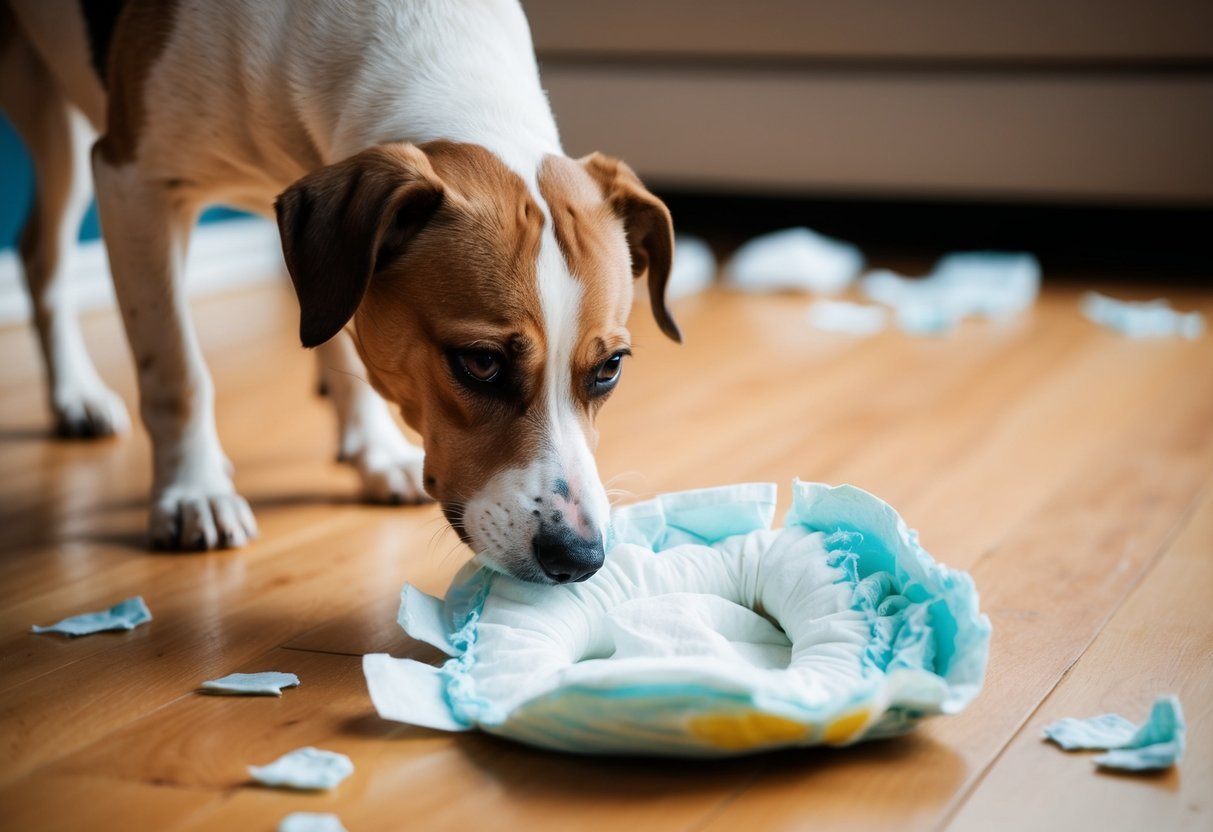
If you notice your dog has eaten part of a diaper, stay calm and check their mouth.
Look for visible pieces of the diaper that you can safely remove.
This can help prevent further issues.
Use your fingers or tweezers to gently grab any diaper material you see.
Be careful not to push the pieces further down their throat.
If your dog resists, it’s best to stop and seek help.
After removing visible pieces, check for any signs your dog may be in distress.
Symptoms can include drooling, vomiting, or difficulty breathing.
If you notice any of these, it’s important to get your dog to the vet right away.
Keep an eye on your dog for a few hours after you’ve removed any visible diaper parts.
Even if they seem fine, it’s still a good idea to contact your vet for guidance.
They may recommend further steps to ensure your dog’s safety.
Prevent Access to More Diapers
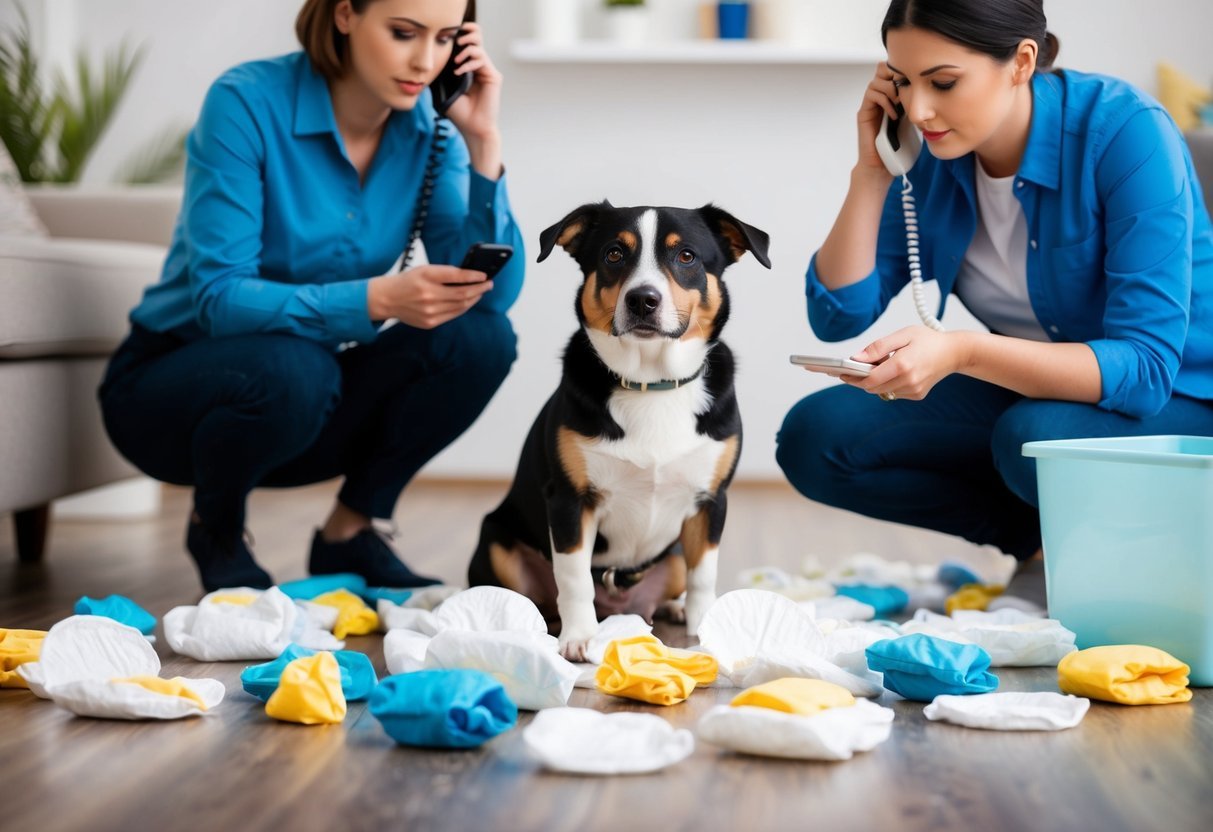
To keep your dog safe, it’s important to prevent access to more diapers.
Start by securing trash bins.
Make sure lids are tight and consider using bins that lock.
Store any diapers, whether clean or dirty, where your dog can’t reach them.
Use cabinets or high shelves to keep them out of sight.
Be aware of places where you might leave diapers out, like near a changing table.
Always put them away immediately after use.
Training your dog to avoid trash is also helpful.
Reward them for ignoring items they shouldn’t be interested in.
With these steps, you can help ensure your dog doesn’t eat any more diapers and stays healthy.
4) Check for Signs of Distress or Blockage
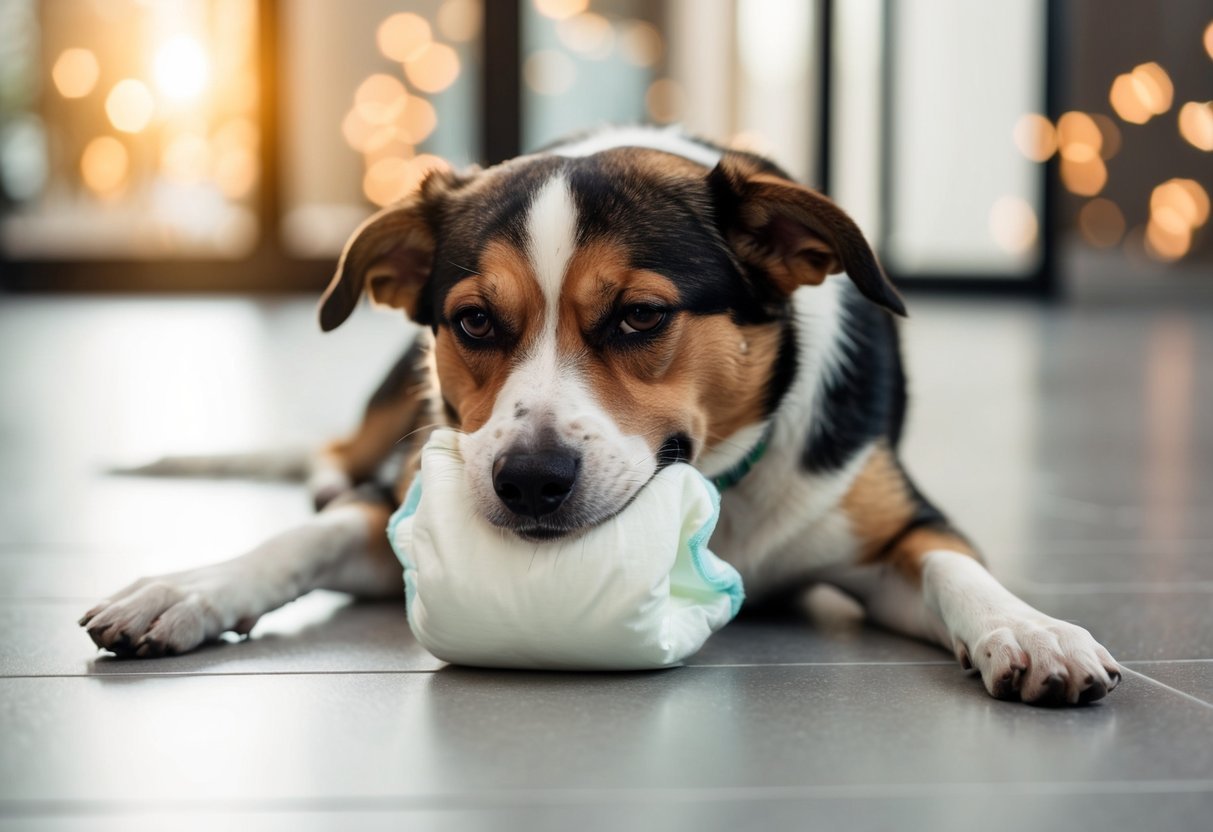
If your dog has eaten a diaper, your first step is to watch for signs of distress.
Look out for unusual behavior, like pacing or whining.
Next, check if your dog is vomiting or has diarrhea.
Vomiting can be a sign that the body is trying to expel something harmful.
If your dog is throwing up more than once, it’s time to contact your vet.
Watch for signs of pain too.
If your dog is hiding, seems lethargic, or is reluctant to move, these might be signs of an issue.
Also, keep an eye on their eating and drinking habits.
If they refuse food or water, that’s a red flag.
Finally, check for bloating in their stomach.
A swollen tummy could mean a blockage.
If you notice any of these signs, don’t hesitate to seek veterinary care.
Prompt action is important for your pet’s health.
5) Call Your Veterinarian for Guidance
If your dog has eaten a diaper, the first thing you should do is call your veterinarian.
They are the best resource for advice tailored to your pet’s situation.
Be ready to explain the details.
Mention the size of the diaper, whether it was used, and how long ago it was eaten.
This information can help your vet make the right recommendations.
Your vet might tell you to induce vomiting or bring your dog in for a check-up.
They will know what steps to take next based on your dog’s condition.
Do not wait for symptoms to appear.
Even if your dog seems fine, it’s important to get professional guidance.
Some materials in diapers can cause serious health issues.
Always follow the instructions your veterinarian provides.
They will help ensure your dog gets the care it needs.
6) Do Not Induce Vomiting Without Vet Approval

When your dog eats a diaper, you might feel the urge to make them throw up right away.
It’s important to resist that instinct.
Inducing vomiting can sometimes do more harm than good.
You should never try this without talking to your vet first.
They know your dog’s health history and can give the best advice.
Some materials in diapers can cause issues if they come back up.
If your vet says it’s safe to induce vomiting, they will guide you on how to do it.
In many cases, your vet might suggest bringing your dog in for an examination instead.
Pay attention to how your dog is acting.
If they seem distressed or are showing symptoms like vomiting, lethargy, or loss of appetite, call your vet immediately for assistance.
Your dog’s safety is the top priority.
Monitor Your Dog’s Behavior Closely
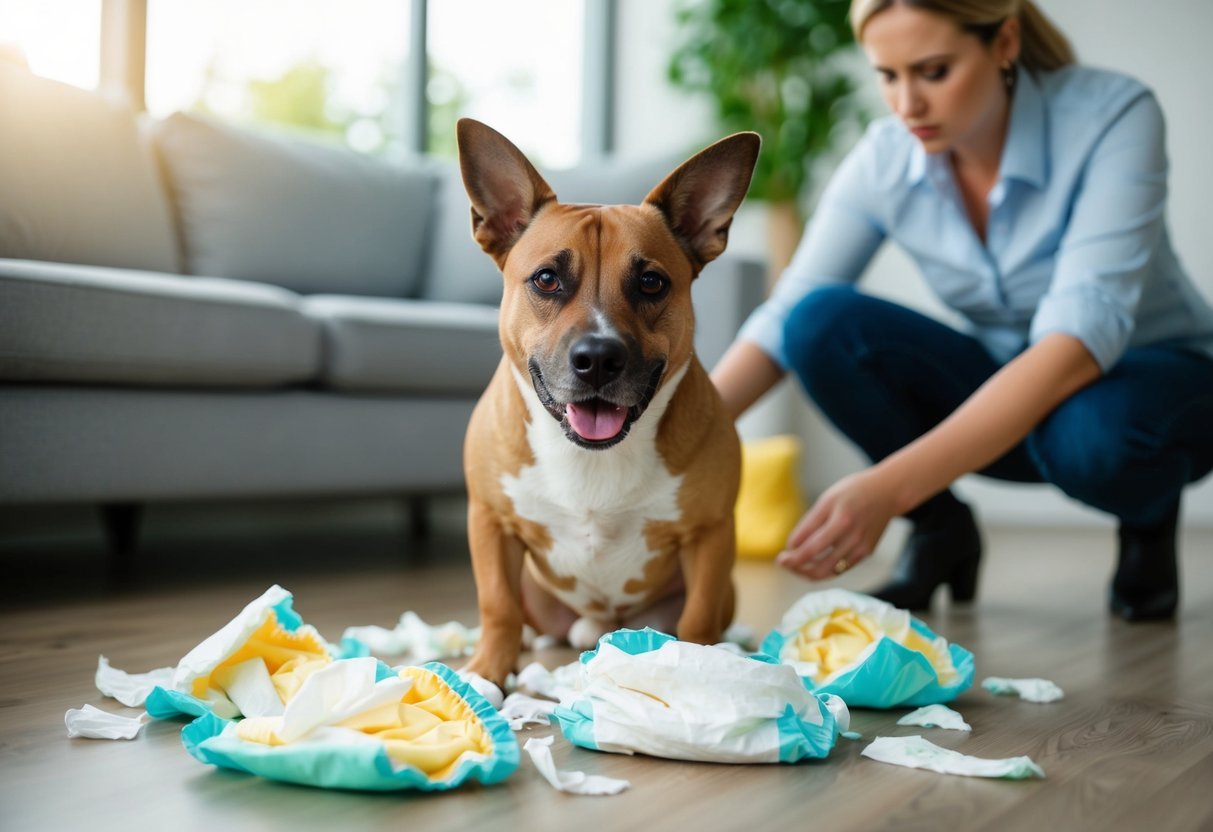
After your dog eats a diaper, it’s important to keep a close eye on them.
Pay attention to how they act and any changes in their behavior.
Look for signs of distress, like whining or pacing.
These can indicate that something isn’t right.
If your dog seems lethargic or loses interest in their usual activities, it may be a cause for concern.
Also, watch for any unusual signs, such as vomiting or diarrhea.
If you notice these symptoms, it’s a good idea to contact your vet.
Monitoring your dog can help you catch issues early.
The sooner you act, the better their chances of staying healthy.
Make sure your dog is drinking water and remains hydrated.
This is especially important if they are vomiting.
Stay aware of their eating habits too.
If they refuse to eat for more than a day, let your vet know.
Understanding the Risks
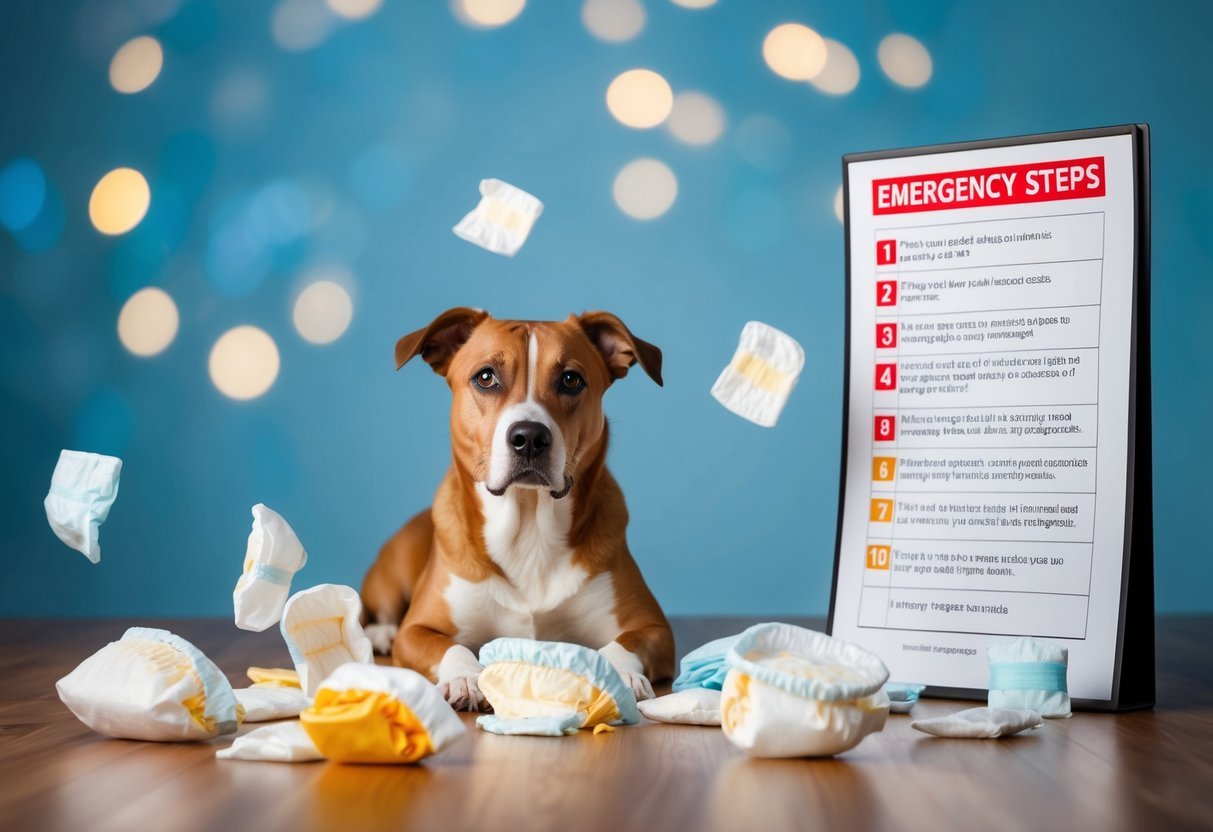
When a dog eats a diaper, it can lead to serious health risks.
It’s important to know why diapers can be dangerous and the potential health hazards that may arise.
Why Diapers Are Dangerous for Dogs
Dogs are curious creatures and often explore things by chewing or eating them.
Diapers, whether cloth or disposable, pose risks due to their materials.
Disposable diapers often contain superabsorbent polymers that can swell significantly.
If your dog ingests these, they can expand in their stomach or intestines, leading to blockages.
Cloth diapers may have plastic parts that can cause choking or damage to the digestive tract.
Keep in mind that diapers can also have unpleasant contents, including bacteria.
If ingested, these can lead to gastrointestinal infections or illness.
Potential Health Hazards
Eating a diaper can lead to various health problems.
The most immediate concern is intestinal obstruction, which can be life-threatening.
Signs of blockage include:
- Vomiting
- Lack of appetite
- Abdominal pain
- Constipation or diarrhea
In addition, the materials in diapers can irritate the stomach and intestines, causing further discomfort.
Your dog might experience lethargy or unusual behavior.
If you suspect your dog has eaten a diaper, it’s crucial to act quickly.
Contact your veterinarian for the best course of action to protect your furry friend.
Immediate Actions to Take
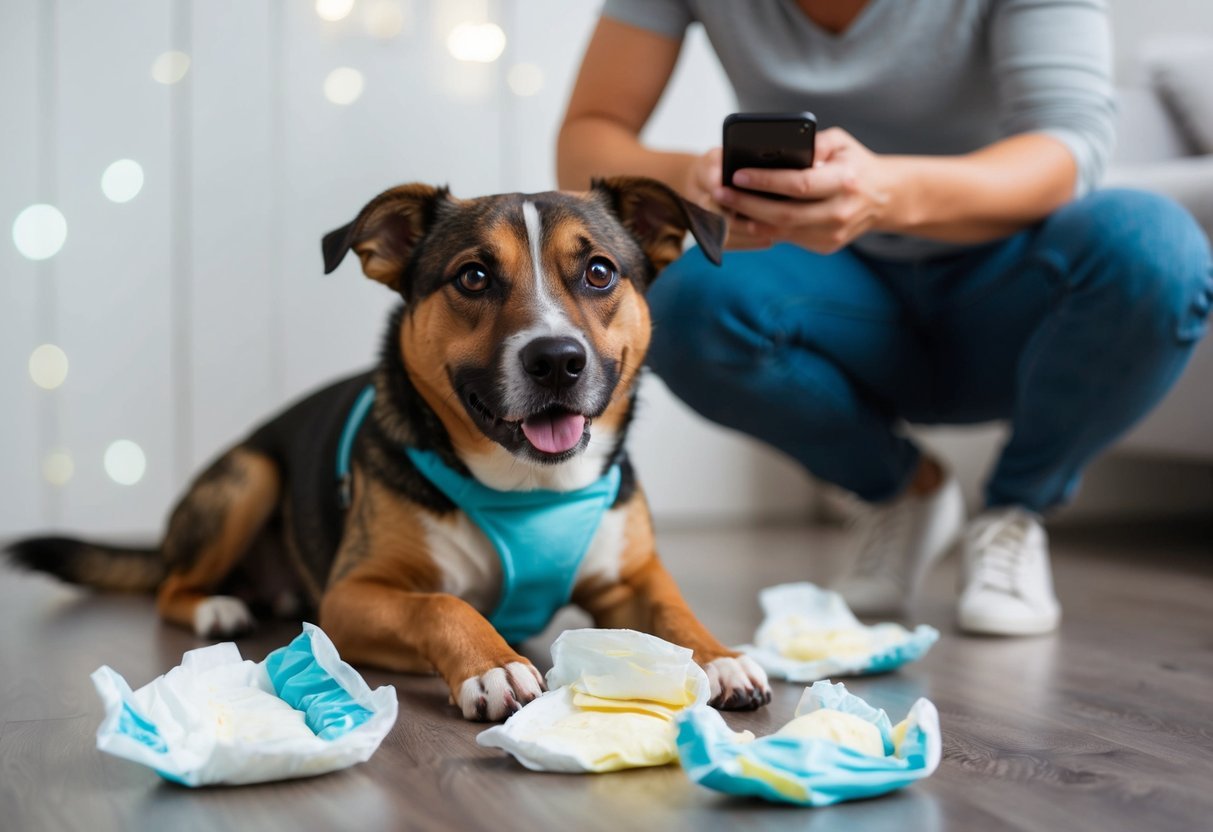
If your dog eats a diaper, it’s important to act quickly and calmly.
Knowing what to do can help ensure your pet stays safe and healthy.
Contacting Your Veterinarian
Your first step should be to call your veterinarian.
Let them know what happened and provide details such as the size of the diaper and how much your dog consumed.
This information helps the vet assess the situation better.
It’s best to reach out right away.
Diapers contain absorbent materials that can cause blockages.
If the diaper was eaten more than 24 hours ago, the vet may perform a rectal exam to check for any obstructions.
This could prevent more serious issues from developing.
If your vet cannot see your dog immediately, they might guide you on what to monitor at home or suggest bringing your dog in for an examination as soon as possible.
Monitoring Symptoms
After contacting your vet, keep a close eye on your dog for any signs of trouble.
Look for symptoms like vomiting, bloating, or lack of appetite.
These can indicate serious complications.
Also, watch for changes in your dog’s behavior.
If they seem lethargic or are straining to defecate, it’s time to head back to the vet.
Monitor their stool for any signs of unusual items.
If you notice pieces of the diaper, inform your vet.
You could keep a log of any symptoms and when they occur.
This record can be helpful for your vet in deciding the next steps for your dog’s care.
Frequently Asked Questions
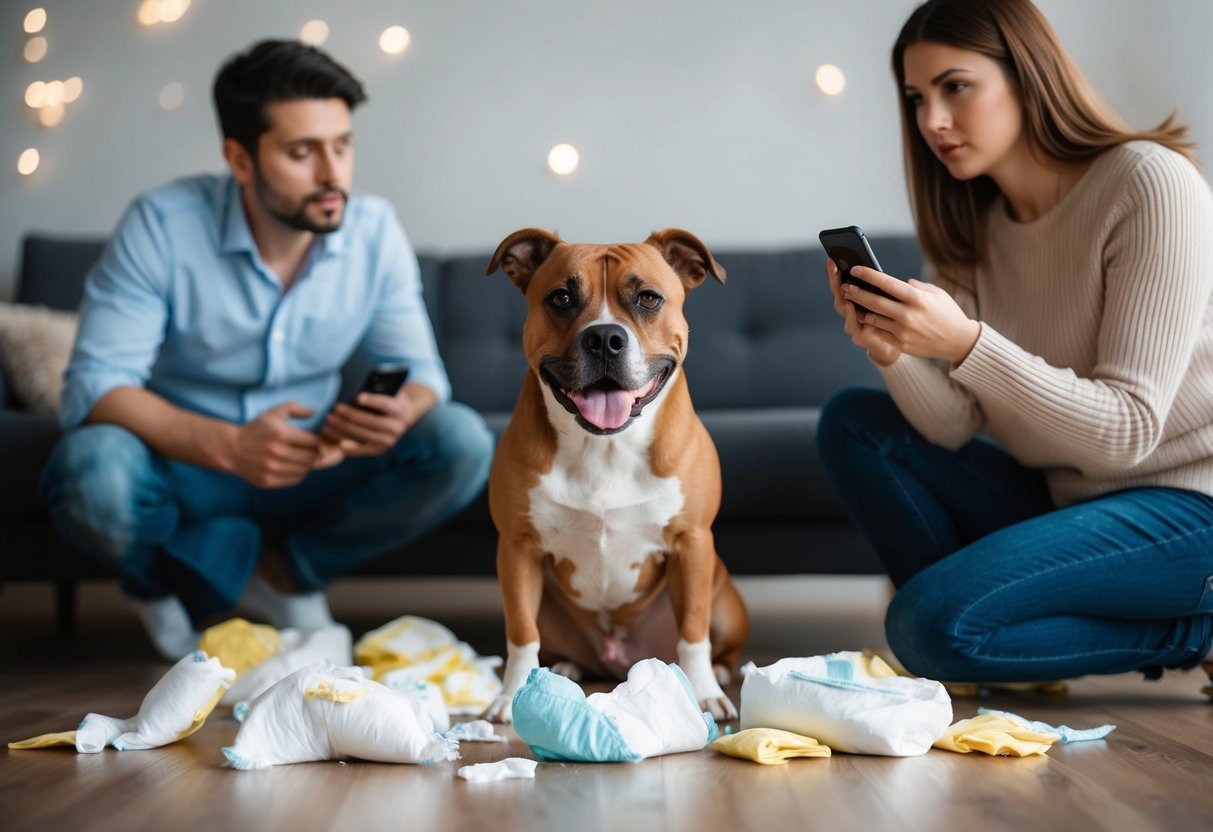
If your dog has eaten a diaper, you likely have some important questions.
Here’s what you need to know about the immediate steps to take and the potential risks involved.
What to do right after I find out my dog has eaten part of a diaper?
First, stay calm.
Assess the situation and check for any visible pieces of the diaper.
If you can safely remove them, do so.
Make sure your dog cannot access more diapers.
Next, watch for any signs of distress.
Could the symptoms my dog is showing be from eating a diaper?
Yes, symptoms like vomiting, diarrhea, or lethargy can be linked to ingestion of a diaper.
If your dog shows any unusual behavior or signs of discomfort, it’s best to contact your vet for advice.
They can help you determine the next steps based on the symptoms.
What’s the deal with those crystals in diapers – are they dangerous for dogs?
The crystals in diapers are typically absorbent materials that can expand in the stomach.
They can cause blockages and discomfort in dogs.
If you know your dog swallowed a diaper, monitor them closely and consult your vet if you have concerns.
How can I help my dog if it swallowed a diaper?
Take immediate action by ensuring your dog is comfortable.
Watch for any distress signals.
Avoid giving them food or water until you talk to your vet.
Your vet may want to examine your dog to decide if further treatment is necessary.
Is my furry buddy at risk if they snacked on a bit of diaper cream?
Diaper cream can contain ingredients that may not be safe for dogs.
If your dog ingests a large amount, it can lead to stomach upset or other health issues.
Always reach out to your vet if you suspect your dog has eaten diaper cream.
Are the absorbent materials in diapers going to harm my dog?
Yes, absorbent materials can pose risks.
They may not break down and can cause blockages in the digestive tract.
If your dog has eaten a diaper, keep a close eye on them and consult with your vet for guidance.

